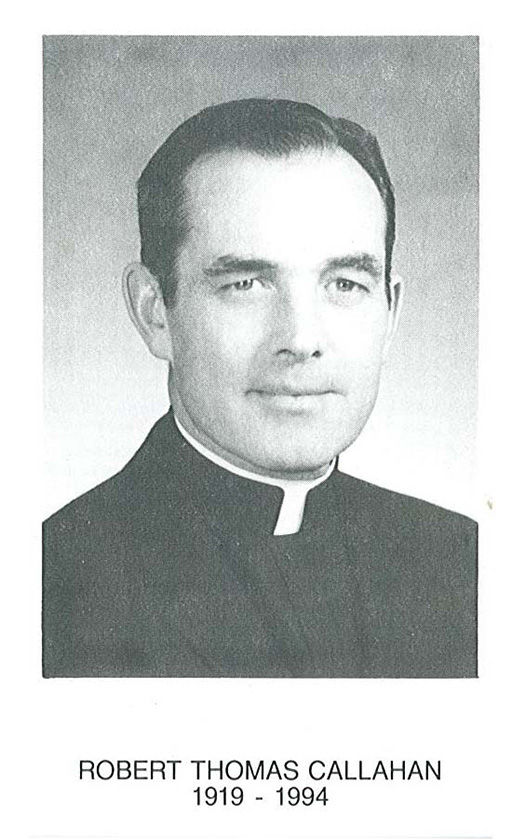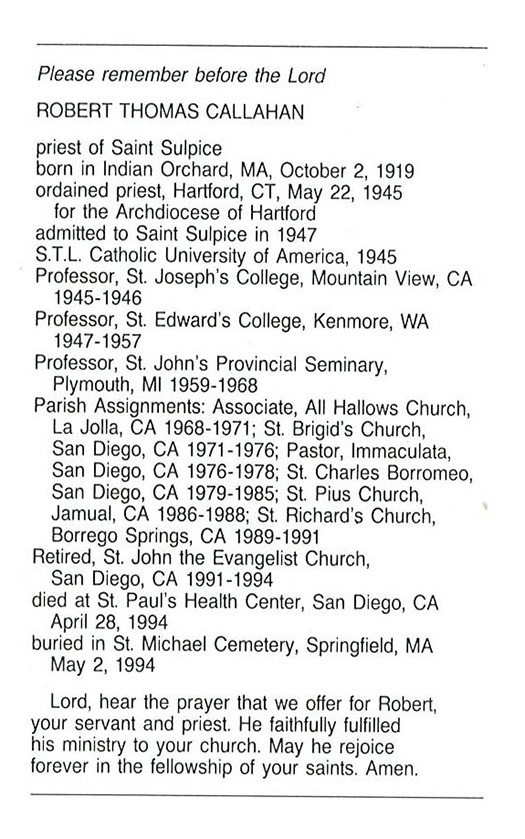Callahan, Robert Thomas
1994, April 28
Date of Birth: 1919, October 2
August 2, 1994
The journey of a thousand miles begins with a single step and fulfills its purpose when it reaches its goal. An arduous journey of a life has a beginning and an end. The path is as special and unique as each individual who has been tasked to be involved in the mystery of life. Father Callahan began his journey in Indian Orchard, Massachusetts; he was born on the feast of the Guardian Angels, October 2, 1919. In many ways, he embodied being an angel to many people, truly a messenger sent by God. If there are two words which typify his life, they might be witness and messenger.
The early part of Father Callahan’s life was spent in preparation for what he was to become, a Sulpician priest teaching in the seminary. He took his undergraduate studies on the East Coast at St. Charles College and St. Mary’s Seminary. He then attended the Theological College of the Catholic University of America where he obtained an M.A. in philosophy and an S.T.L. in Theology. He was ordained for the Archdiocese of Hartford on May 22, 1945. From 1946 to 1947, he participated in the Solitude year of formation for aspirants to the Society of St. Sulpice and was received as a member in 1947. Here he learned well what it means to become a Sulpician; he learned, too, the spirituality which supports our calling. He absorbed well and deeply the absolute primacy of God in our lives, and the power and mystery of God being incarnate and transcendent, a Being comprehensible in Christ and incomprehensible in Trinity. These two themes were later to become the substance and form of much of his teaching and preaching. During this period of preparation, he faced his first crisis when he was prevented from finishing his doctoral dissertation at the Institut Catholique in Paris; someone had already published a similar dissertation. Obviously, this was before the computer age. It was quite a blow to someone with the brilliance of Father Callahan. He returned from Paris without his diploma but began his ministry of teaching with enthusiasm and dedication.
There is some overlap between preparation, the first phase of Father Callahan’s life, and the second, academic involvement. While Father Callahan was the object of others’ teaching, he had been himself engaged in teaching in a number of places before he took up his doctoral studies. He taught on the West Coast at St. Joseph’s College, Mountain View from 1945-1946, and St. Edward’s seminary in Seattle from 1947-1957. When he returned from Paris, he was assigned to teach at St. John’s Provincial Seminary in Plymouth, Michigan. He was to be there for almost ten years from 1959-1968. His areas of specialization were: Dogmatic Theology, Liturgy, and Church History. Father Callahan was also Master of Ceremonies during this time. The writer of this account was a student of his from 1963-1967, and perhaps there is, in the light of that fact, an insight for us all: be kind to students because one never knows who will be preaching your funeral homily! While Father Callahan was at St. John’s, many cities across the country were being set ablaze. This was a hectic time for the country and for our Church. We were in the midst of the Vietnam War, and the Vatican Council had just recently closed. The seminary was becoming more and more unstructured, and Father Callahan was having a hard time adjusting to the untraditional outlooks.
With the permission of his Sulpician superiors and in cooperation with the Diocese of San Diego, Father Callahan began the third and final phase of his journey – parish ministry. However, before reviewing what he did in the parishes in which he served, it is necessary to underscore what kind of teacher Father Callahan was. He was no ordinary teacher or professor. He was probably one of our most creative and imaginative teachers. He was a person imbued with a sense of mystery, and it was this sense of mystery that he taught. He was a mystic, a user of symbols, an exemplar of Irish wit and charm, a gentle Christian, good-humored, deeply faithful, doggedly determined, someone who evidenced that the academic person could also be pastorally oriented, that the good pastor had to be academic. That one never could know too much speculative theology was the starting point for much of his teaching. Although his study was lined with books, most of which I am sure he had read, he seldom quoted from other theologians or other authors, and the reason for this reflects his understanding of scholarship. What he studied, he integrated into his own life; and it was the fruit of his own learning that he shared with his students. It is no wonder, given the climate of those times, that he became so unhappy and wanted to leave the world of the academy to find peace, joy, and a sense of meaning in the minds and hearts of people in the parish.
He once said that he wanted to go to the end of the earth. In 1968, Father Callahan moved, poetically speaking, to the end of the earth - San Diego. He served at All Hallows Church; St. Brigid’s in Pacific Beach where, in view of my being engaged in studies at the United States International University, we served together for three years from 1973-1976: Immaculata at the University of San Diego Campus; St. Charles Borromeo Parish; Pius X; and St. Richard’s in Borrego Springs, from which he retired three years ago to take up residence at St. John the Evangelist. While fulfilling the responsibilities of Pastor at St. Charles Borromeo, Father Callahan received the honor of becoming a Monsignor. It is ironic that no mention of this fact is found in any of the correspondence either from him to the Provincial House, or from the Provincial House to him. It seems that, like so many other aspects of his shy character and self-effacing manner, he allowed Bishop Leo Maher to confer this recognition quietly and without attention being drawn to it. He is the only American Sulpician who has become a Monsignor. Father Callahan found happiness in San Diego, and he wrote in 1982, “San Diego continues to be the most wonderful place in the world. Last Saturday – like a birthday – I celebrated my 14th year in the Diocese. Looking back, it seems like fourteen days. I’m still very much a Sulpician at heart and pray fondly for you and the work of the Society.” In all the parishes named above, Father Callahan’s preaching was similar to his teaching, and it was this that made him an excellent preacher for he shared the results of his own contemplation. He preached and challenged us to see and love in ourselves what Jesus sees and loves in us. He knew Jesus intimately - he knew where Jesus is - in the lonely and the broken-hearted. Once he left the ivory tower of the academy, his role was to translate theology into the lives of God’s people. While in the parishes, he was always friendly, courteous, Christ-like, prayerful, good-natured, good-hearted, relational, but always somewhat a mystery. He had a magnetic personality that drew people to him; he, in turn, introduced them to the Lord. He was a bridge over which people passed to meet the Lord. He used his humanity to convey the love that Christ has for people. No elderly person left his presence without receiving an act of kindness and love.
During the latter part (retirement) of this third phase (active ministry) of his life, Father Callahan began life’s final chapter. I had a lovely visit with him in January of 1994, and I am very grateful because I was able to put into words the gratitude so many people felt for him. He had a hard time listening to my litany of praise and thanksgiving for his life and ministry. He talked about ‘falling apart’ and recalled the words written by Thomas Jefferson, “We must expect that, worn as they are, here a pivot, there a wheel, now a pinion, next a spring, will be giving way; and however, we may tinker them up for a while, all will at length surcease.” He knew he was falling apart. When he fell on February 8th that fact was reinforced with greater clarity. However, he reminded people of what he taught —that death must be an act of worship if it is to be preserved from being blasphemous; that somehow a person had to make a gift of his or her life back to God who first graced life into them. Father Callahan witnessed to this fact, and he witnessed to the end. He was hopeful and maintained his sense of humor and wit. He internalized the message of Paul to the Romans – that hope will not leave us disappointed, because Jesus is the source of eternal life. Father Callahan accepted truth as it is – not an idea which captures our imagination, but a promise kept by a person. Father Callahan listened to Jesus who promises us that we will find him in the love we have for one another. As the early disciples witnessed to the name of Jesus, so too did Father Callahan continue to be a messenger of God’s presence; and, in his life, a witness to that presence.
His final lesson to us was the fact that the greatest dignity to be found in death is the dignity of the life that preceded death. He was graced with the dignity of the Priesthood, and he was truly an angel, God’s messenger – one who in his own ministry had witnessed to the gift of human existence. Father Callahan died at the St. Paul’s Health Center in San Diego on April 28, 1994. His journey, begun in Indian Orchard had brought him, body and soul, to San Diego from where his soul continued on to its eternal goal. His body was borne back to Indian Orchard to St. Michael’s Cemetery, and on May 2, 1994 was laid to rest next to that of his beloved mother. Truly, life is lived forward, but understood backwards.
Melvin C. Blanchette, S.S.
Provincial House


